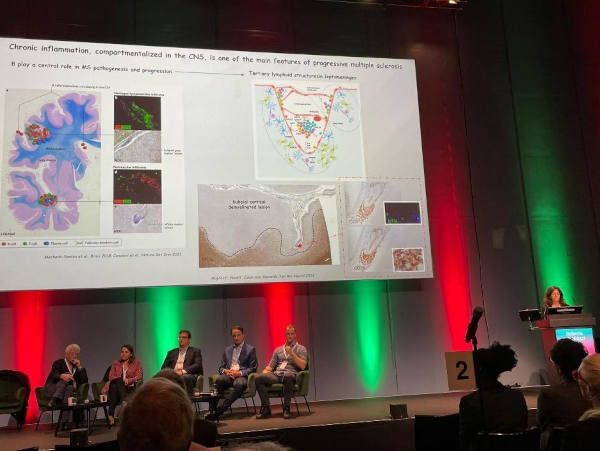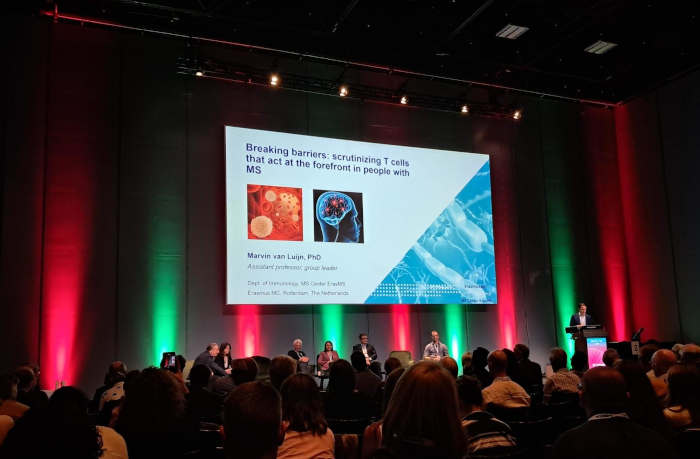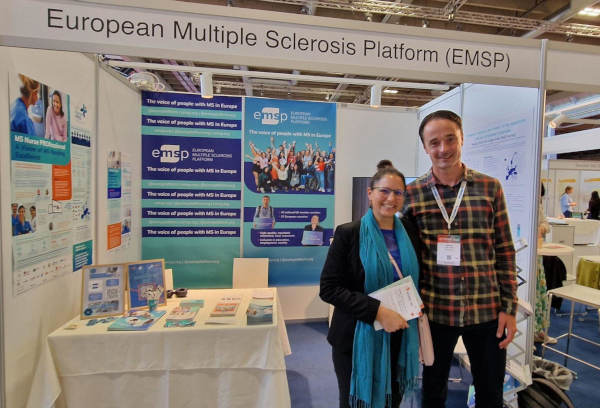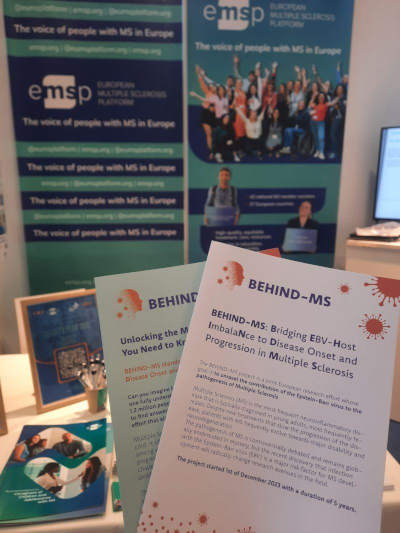BEHIND-MS at ECTRIMS 2024
Highlighting Cutting-Edge Research and Patient Engagement
Posted on October 18, 2024 • 4 minutes • 804 words
Table of contents
BEHIND-MS at ECTRIMS 2024: Highlighting Cutting-Edge Research and Patient Engagement
The BEHIND-MS project had a strong presence at ECTRIMS 2024 , Europe’s leading multiple sclerosis (MS) research conference. Our participation spanned a variety of key activities, from cutting-edge scientific presentations to engaging with the MS community and researchers at our booth. This year, the focus was on the critical advancements in MS research and the promotion of resources aimed at empowering patients and professionals alike.
Roberta Magliozzi: Unravelling the Role of Epstein-Barr Virus in Progressive MS
Professor Roberta Magliozzi, from the University of Verona, delivered a talk titled “Combined neuropathology and in-situ gene sequencing characterization of meningeal inflammation in progressive multiple sclerosis: evidence of Epstein-Barr virus-linked B cell intrathecal expansion.”
In her talk, she highlighted how chronic inflammation within the central nervous system (CNS) is a hallmark of progressive multiple sclerosis (pMS). One of the most intriguing findings in this area of research is the expansion of B cells in the meninges, which form aberrant structures resembling lymphoid organs, known as tertiary lymphoid-like structures (TLS). These structures are linked to persistent intrathecal inflammation in pMS.
Magliozzi’s research focuses on the potential role of the Epstein-Barr virus (EBV) as a driver of this inflammatory activity. Her team’s preliminary data suggests that EBV-infected B cells may proliferate in the meninges, driven by viral factors such as the EBV latent-cycle antigen, EBNA2. This finding opens new avenues for potential biomarkers and therapeutic targets, including B cell markers like CD81, CD10, RASGRP2, and immunoglobulin M (IgM).
Magliozzi emphasized that targeting EBV-driven B cell expansion could represent a promising strategy for treating pMS and potentially slowing disease progression.

Professor Magliozzi presenting the latest findings
Marvin van Luijn: Epstein-Barr virus and brain entry of B and T cells in MS
Dr. Marvin van Luijn from the Erasmus MC in Rotterdam gave a talk entitled: “Breaking barriers: scrutinizing T cells that act at the forefront in people with multiple sclerosis”
Dr. Marvin van Luijn’s research focuses on the role of T cells, particularly CD4+ T cells, in the early stages of MS, emphasizing how subsets that respond to EBV exactly look like and contribute to MS development. In his recent talk, he highlighted the Th17.1 subtype of T cells, which has been shown to play a crucial role in MS pathology by crossing the blood-brain barrier (BBB) even before inflammation occurs. These Th17.1 cells, specifically the granzyme K-producing ones, have a unique ability to infiltrate the central nervous system (CNS).
Van Luijn’s work uncovers that these cells have a unique effector program that makes them susceptible to becoming cytotoxic when exposed to certain inflammatory signals such as IL-12 and IL-18. Once inside the CNS, Th17.1 cells could contribute to disease onset in two significant ways:
- Interaction with B cells: Th17.1 cells assist brain-infiltrating B cells in maturing into antibody-secreting cells, which can further perpetuate the autoimmune response in the CNS.
- Interaction with microglia: Th17.1 cells are triggered by CNS-resident immune cells (microglia) that express CXCL16, IL-12, and IL-18, which can lead to direct tissue damage.
Van Luijn also posits that EBV-infected B cells could be an early trigger for such pathogenic events, possibly long before MS diagnosis, suggesting that EBV plays a critical role in the initial stages of MS development. His research aims to provide a better understanding of how EBV infection ties into the immune dysregulation seen in MS.

Dr. van Luijn (Erasmus MC) presenting his talk at ECTRIMS
EMSP: Introducing people with MS and researchers to BEHIND-MS
Beyond the scientific sessions, EMSP played an active role in connecting with the MS community through its booth at ECTRIMS 2024. The EMSP team showcased a range of educational materials, including both scientific and lay versions of brochures designed to bridge the gap between complex research findings and accessible, patient-centered information. These brochures were particularly well-received by attendees, offering insights into recent advancements in MS research and practical information for patients and caregivers.

Patricia Moghames (EMSP) and Prof. Marvin van Luijn (ErasmusMC) meeting at the EMSP booth at ECTRIMS
Moreover, EMSP’s presence extended to the ECTRIMS Patient Community Day , where we engaged directly with patients, sharing resources and highlighting the organization’s ongoing commitment to supporting the MS community through education, advocacy, and research.

EMSP booth at ECTRIMS promoting the BEHIND-MS brochures
ECTRIMS 2024 underscored the importance of advancing MS research and supporting the patient community. Dr. Roberta Magliozzi’s innovative findings on Epstein-Barr virus in progressive MS offer new insights into potential therapies, while Dr. Marvin van Luijn’s research shows that certain immune cells, triggered by Epstein-Barr virus, can enter the brain early in MS and help in damage causing. And EMSP’s engagement at the conference and Patient Community Day highlights our commitment to empowering patients. The BEHIND-MS project continues to bridge science and advocacy, keeping patient needs at the forefront.
